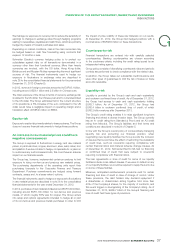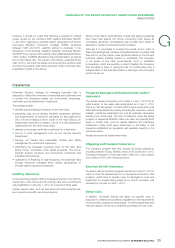APC 2012 Annual Report Download - page 40
Download and view the complete annual report
Please find page 40 of the 2012 APC annual report below. You can navigate through the pages in the report by either clicking on the pages listed below, or by using the keyword search tool below to find specific information within the annual report.
2012 REGISTRATION DOCUMENT SCHNEIDER ELECTRIC38
OVERVIEW OF THEGROUP’S STRATEGY, MARKETS AND BUSINESSES
1RISK FACTORS
Legal risks
Our products are subject to varying national
and international standards and regulations
Our products, which are sold in national markets worldwide,
are subject to regulations in each of those markets, as well
as to various supranational regulations. Those regulations
include trade restrictions, tariffs, tax regimes and product safety
standards. Changes to any of these regulations or standards or
their applicability to the Group’s business could lead to lower
sales or increased operating costs, which would result in lower
earnings and profi tability.
Our products are also subject to multiple quality and safety
controls and regulations, and are governed by both national and
supranational standards. The majority of our products comply with
world-recognized International Electrotechnical Commission (IEC)
standards. Any necessary capital investments or costs of specifi c
measures for compliance with new or more stringent standards and
regulations could have a negative impact on Group operations.
The development and success of the
Group’sproducts depends on our ability
toprotect our intellectual property rights
Our future success depends to a signifi cant extent on the
development, protection and maintenance of our intellectual property
rights. Third parties may also infringe our intellectual property rights,
and we may have to expend signifi cant resources monitoring,
protecting and enforcing our rights. If we fail to protect or enforce
our intellectual property rights, our competitive position could suffer,
which could have a material adverse effect on our business.
To mitigate this risk, the patents developed or purchased by the
Group are tracked by the Industrial Property team within the
Finance&Control - Legal Affairs Department. All intellectual property
queries are centralized and managed by this team for the whole
Group and in coordination with the other Finance&Control - Legal
Affairs Departments it ensures the Group’s interests are defended
throughout the world. The same approach and organization applies
for the Group’s brand portfolio.
Litigation
Following public offers launched in 1993 by SPEP (the holding
company of the Group at the time) for its Belgian subsidiaries Cofi bel
and Cofi mines, proceedings were initiated against former Schneider
Electric executives in connection with the former Empain-Schneider
Group’s management of its Belgian subsidiaries, notably the Tramico
sub-group. At the end of March2006, a criminal court in Brussels,
Belgium, ruled that some of the defendants were responsible for
certain of the alleged offenses and that certain of the plaintiffs’ claims
were admissible The plaintiffs claimed damages representing losses
of EUR5.3million stemming from alleged management decisions
that reduced the value of or undervalued assets presented in the
prospectus used in conjunction with the offering, as well as losses of
EUR4.9million in relation to transactions carried out by PB Finance,
a company in which Cofi bel and Cofi mines held minority interests.
In its ruling, the court also appointed an expert to assess the loss
suffered by those plaintiffs whose claims were ruled admissible. The
expert’s report was submitted in 2008. The defendants and the
companies held civilly liable contest the amounts provided by the
legal expert in their entirety on the basis of such reports drawn up
by Deloitte. Schneider Electric and its Belgian subsidiaries Cofi bel
and Cofi mines were in turn held civilly liable for the actions of their
senior executives who were found liable in these proceedings,
with Schneider Electric paying the legal expenses of the former
executives involved to the extent not covered by insurance. After a
settlement agreement was signed with a group of plaintiffs, the case
remains pending before the Brussels Appeals Court, due to appeals
against parts of the March2006 ruling as well as a ruling made
in2011 by the Court of First Instance regarding the admissibility of
the plaintiffs’ claims.
In connection with the divestment of Spie Batignolles, Schneider
Electric booked provisions to cover the risks associated with certain
major contracts and projects. Most of these provisions were made
in1997. Provisions were also booked for the remaining risks, based
on management’s best estimate of their expected fi nancial impact.
Nevertheless, certain new fi les implicating the Group for Spie
Batignolles’ past activities could still arise and result in costs.
Schneider Electric, in addition to other companies operating in
the same industry, has also been involved in legal proceedings
initiated by the European Commission with regard to an alleged
agreement concerning gas insulated switchgears (“GIS”) resulting
from the activities of two former subsidiaries operating in the high
voltage segment which were sold in2001. Schneider Electric did
not appeal the decision made by the Commission with regard to
this matter on January24, 2007, and was fi ned EUR8.1million for
which two-thirds reimbursement from its two former subsidiaries
was recovered in2012 after multiple legal actions. However, this
decision, although provisionally executed is subject to appeal.
Also, in relation to the GIS disputes, on May 21, 2010, British
company Power networks (formerly EDF EnergyUK) launched a
claim against the same companies, including Schneider Electric, for
damages of GBP15million in the High Court in London, England.
This claim is currently being investigated and there were no
signifi cant developments in2012.
Schneider Electric was also among 2,000 companies worldwide
that were mentioned in the Volcker report on the Oil for Food
program published by the UN in October2005. Schneider Electric
was investigated by the French judiciary in2010 in relation to this
report, which stated that the Group had entered into agreements
with the Iraqi government between 2000 and 2004 under which
surcharge payments totaling approximately USD450,000 are
alleged to have been made to the Iraqi government, thus violating
the provisions of the embargo in force at that time. After several
priority preliminary rulings on the question of constitutionality, to date
all rejected, and other procedural remedies, the public prosecutor’s
department submitted its indictment to the examining magistrate
on December18, 2012. In this indictment, 14French companies,
including Schneider Electric Industries, were referred to the court.
The examining magistrate’s ruling is expected in2013.
























